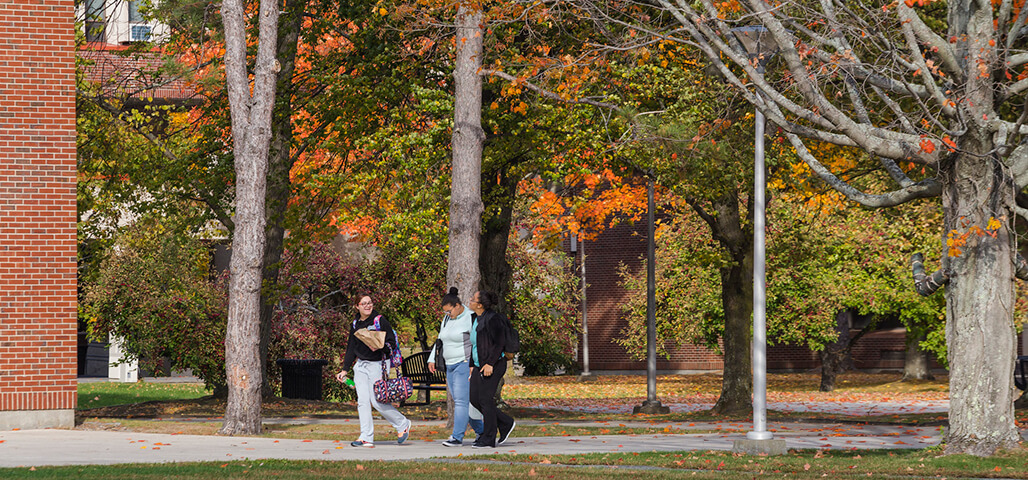Undocumented and DACA Students

NECC Welcomes Applications from Deferred Action for Childhood Arrivals (DACA) and Undocumented Students
Learn more about Deferred Action for Childhood Arrivals (DACA)
In-State Tuition and Fees Benefit
DACA students are eligible for in-state tuition and costs. Submit the following documents:
- C-33 work permit (Employment Authorization Documentation)
- I-797 (Notice of Action).
- Proof of Massachusetts residency
Paying for College
Undocumented and DACA students are not eligible for federal aid, but are encouraged to apply for state and institutional financial aid. Please review the NECC payment options and apply for NECC scholarships. As a DACA student, you are also eligible for tuition credit if you’ve received the John and Abigail Adams Scholarship.
We know that many members of the NECC community are concerned about immigration enforcement actions that may occur at NECC. Below is a list of FAQs to provide you with information about how to respond in such a situation. Please note that as Department of Homeland Security (DHS) policies and practices evolve, we may update this guidance as warranted.
Frequently Asked Questions Related to Immigration and Customs Enforcement (ICE) Officers on Northern Essex Community College (NECC) Property
Can NECC prevent federal immigration enforcement officers from coming on campus or entering campus buildings and other NECC property?
It depends. As a public community college, NECC is largely open to the general public. Federal immigration enforcement officers may enter areas open to the general public without a warrant. However, public access is limited in certain areas of NECC campuses and property. Included in this category of limited access spaces are administrative or faculty offices, classrooms while in session, laboratories, and locker rooms.
If I see ICE agents on campus, does it mean they are conducting immigration enforcement actions?
No. It is important to note that ICE or federal officials from the Department of Homeland Security may be on campus for reasons unrelated to enforcement actions. Due to our International Programs, the College is required to report certain information about F-1 or J-1 visa status students to ICE. This reporting is routine, and the College is required to comply with on-site visits to review records when requested.
In what situations can federal immigration enforcement officers enter limited access, nonpublic areas?
Federal immigration enforcement officers are required to have a criminal arrest or search warrant to lawfully enter limited access, nonpublic areas without consent. Most often, immigration officers who might come to campus would be acting on civil, not criminal, authority, and generally carry administrative warrants. Administrative warrants are not signed by a judge and do not authorize officers to enter limited access areas without consent.
What should staff members do if a federal immigration enforcement officer asks for access to a limited access area?
If a federal immigration enforcement officer asks for access to a limited access area, College employees should inform the immigration officer that College policy requires you to refer them to the Public Safety office.
Will the NECC Police Department work with federal immigration officers to apprehend and remove individuals from campus?
No. The NECC Police Department will not ask anyone about their immigration status, and does not arrest anyone solely on the basis of their immigration status. The NECC Police Department will not enforce a warrant issued by ICE that is solely for an administrative matter, such as residency or immigration status. The NECC Police Department will be required to enforce a criminal warrant from any law enforcement agency, including ICE. Criminal warrants are issued when probable cause exists to believe the named subject in the warrant has committed a crime. In other situations not related to immigration, officers may inquire about an individual’s country of origin to notify their consulate of an arrest, but that inquiry does not include questions about immigration status.
Can federal immigration enforcement officers enter my home/apartment?
Not without a criminal warrant or consent. A student need not allow entry to any law enforcement officer who is not in possession of a criminal warrant, regardless of what that officer might say. Individuals have a reasonable expectation of privacy in their homes. A warrant of removal/deportation is a civil or administrative warrant and is not signed by a judge. Administrative warrants do not authorize officers to enter a home without consent. If an immigration officer has a civil or administrative warrant, undocumented students have a personal choice whether to grant consent to enter their residence. However, if a law enforcement officer has a criminal search or arrest warrant signed by a judge, the officer does not need consent to enter the apartment or arrest an individual named in the warrant.
What does a federal immigration enforcement warrant allow an immigration officer to do?
There are generally two types of warrants used by federal immigration enforcement officers: an administrative warrant, and a judicial warrant.
An administrative warrant might also be called a Warrant of Removal/Deportation. This type of warrant does not allow an officer to enter and search a home unless a resident of that home gives consent. An administrative warrant might allow an officer to arrest the person described in the warrant, if that person is in a public space.
A judicial warrant might be a search warrant, or an arrest warrant. In either case, it must describe sufficiently the residence that is to be searched, or the person to be arrested (either by name, or clear description). In every instance, a judicial warrant is only effective if it is signed by a federal judge.
As a student, do I need to give information to an ICE agent?
No. Individuals have the right to remain silent under the 5th Amendment of the U.S. Constitution, and do not need to answer questions, or sign or provide any documents without a lawyer present.
What should staff members do if a federal officer asks for or presents a subpoena for personally identifiable private information or records about a student or employee?
Faculty or staff who receive a request from a federal officer for any information about a student should refer the agent to Public Safety. Personally identifiable educational records are protected by a variety of privacy laws including the Family Education Rights & Privacy Act (FERPA). As a College employee, you are required to maintain the confidentiality of these records.
What if I would like to speak with an immigration attorney?
If you would like to speak with an immigration attorney, contact our Director of International Students and Special Populations, Maria Hernandez, mhernandez@necc.mass.edu and she will provide you with a list of local immigration attorneys.
Where can I get more information on my rights as an undocumented student?
The Massachusetts Immigrant and Refugee Advocacy Coalition (MIRA) has developed a webpage with more information about your legal rights. Know Your Rights
Print View

